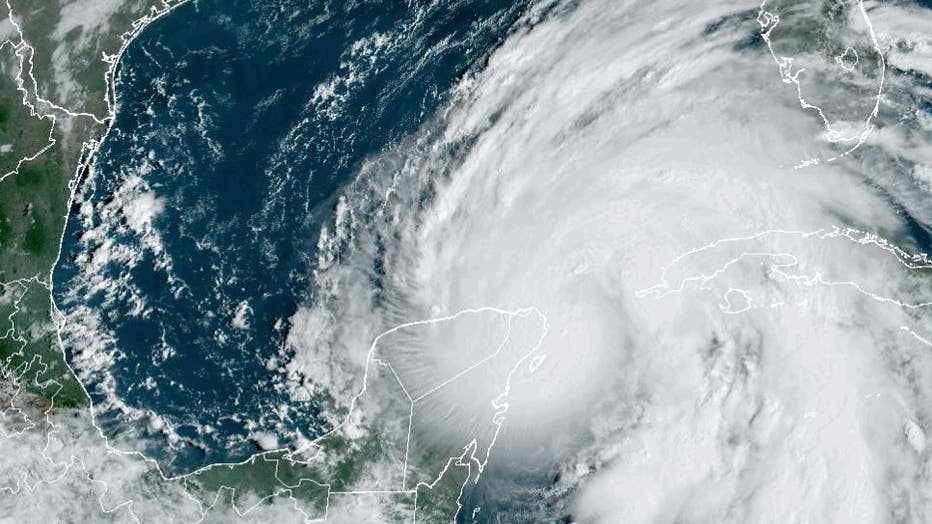Hurricane Helene: Here's how to prepare for severe storms, power outages
ATLANTA - Hurricane Helene is rapidly intensifying as it makes its way toward landfall in Florida and into Georgia on Thursday evening.
Helene became a tropical storm on Tuesday and grew into a hurricane on Wednesday morning. Experts expect the storm to continue gathering strength as it passes through the Gulf of Mexico.
While the effects of Helene have not hit Georgia yet, now is the time to prepare for the serious storms, flooding, and power outages expected to impact the Peach State from Thursday night to Friday morning.
RELATED: The latest on Helene | Closings/cancelations
Here are suggestions from Georgia Emergency Management and Homeland Security Agency about what you should and shouldn't do before, during, and after a hurricane.
State of emergency declared ahead of Helene
Georgia has issued a state of emergency and are warning residents to be prepared for Helene.
How to prepare ahead of time for a hurricane
- If you are in the path of the hurricane, be familiar with where you could take shelter as the storm gets closer. Make a family communication plan and familiarize yourself with your evacuation route and local shelter locations. If you have pets, make arrangements for them in advance.
- Make a Ready kit with at least three days of supplies. That includes water, food, a flashlight, and medicine. You can find a full list of recommended items here.
- Bring in all of your outdoor furniture, decorations, and anything else that is not tied down.
- Fill up your car's gas tank in case of an evacuation.
- Set your refrigerator to the coldest setting and place your valuables in a waterproof container on the highest level of your home.
- Keep your drains and gutters free of debris and clutter. Trim or remove trees that could fall on your home.
- Sign up for alerts through the Emergency Alert System (EAS) and National and Atmospheric Administration (NOAA) Weather Radio emergency alerts.
- Charge your cell phone and any other devices you may need to be charged.

Hurricane Helene (Photo from NOAA)
What you should do during a hurricane
- If a hurricane is likely in your area, keep alert by following the news on the TV or radio and avoid using the phone except for emergencies.
- Fill your bathtub with water so that you have a supply for sanitary purposes.
- If you are sheltering in place, make sure the room that you're in is away from glass doors or windows. Make sure you have all the necessary emergency supplies and remain in the shelter until the storm has passed.
- Only use generators outdoors and keep away from windows.
- If you are told to evacuate, leave immediately and do not pass barricades.
- If you're driving, do not try to cross flooded roads. According to FEMA, it takes just six inches of fast-moving water to knock a person down, and just one foot of moving water to sweep a vehicle away.
When will Helene hit Georgia?
Helene continues to trek north and is intensifying. The storm could be a major hurricane before it makes landfall somewhere in the Panhandle of Florida. It is then expected to move inland, bring tropical-storm-force winds, heavy rains, lightning, and even spin-up tornadoes to north Georgia. Here's the latest from the FOX 5 Storm Team.
What to do in a power outage
- The important thing for a power outage is preparation. Try to have your cell phone charged and a flashlight with extra batteries on hand.
- Keep your freezer doors closed. Georgia Power says that frozen food will be able to keep for two or three days without power.
- Once the storm is over, assume all power lines are energized. Avoid touching any downed lines or tree limbs that are touching power lines. Do not go into areas with debris or fallen trees, as power lines may be hiding in the foliage.
- Report all power outages and downed lines to Georgia Power or your local power company.
What to do after a hurricane
- After the hurricane has passed, keep updated on the news via TV, the radio, or the internet to see additional instructions from emergency officials.
- Stay out of floodwaters, as it may be electrically charged or contaminated.
- If you have evacuated, do not return to your home until you are told it is safe by local authorities. Flooding could still cause dangerous conditions on roads and unstable buildings.
- If your home floods and does not dry properly within 24 to 48 hours, dangerous mold can develop. Here are the CDC’s guidelines on mold identification and cleanup.
- While hurricanes can be terrifying and life-threatening experiences, taking the proper precautions and knowing what to do in any scenario can make all the difference.

